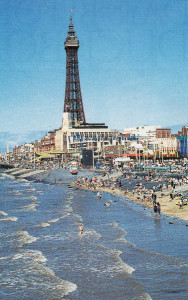
My eldest sister and I worked in a commercial hotel in Blackpool, an arrangement my father agreed to on the understanding that we stayed together. My sister was to keep a weather eye on me. We lived in at the hotel. I was 15.
The owners were originally from Yorkshire. Mrs O was energetic, business-like and an excellent plain cook.
Mr O seemed to have little to do with the running of the hotel. He was a professional pianist yet he never went anywhere except to his music room to practise.
My duties were numerous. Before breakfast we would creep quietly down the stair-carpet of turkey red, holding on to the polished banister. We were told not to make a noise. Nobody else wanted to be up and about at six in the morning!
Polishing floor surrounds in hall, dining room and residents lounge came first. The Hoovering would come later when breakfast was finished with and the guests departed for the day. Mrs O called them “My gentlemen”. They were mosdy reps. I never encountered a woman there.
My sister meanwhile scrubbed a flight of stone steps, washed imaginary dirt from the heavy front door and cleaned its stained glass panels.
Breakfast was a splendid meal. Fruit, cereal and a plate to follow which overflowed with bacon, sausages, eggs (two each) tomatoes and fried bread. For anyone who really prided themselves on a big appetite it was wonderful. It was followed by toast and marmalade, if one had the stomach for it!
The rest of my morning was spent changing beds and more cleaning in preparation for new arrivals later that day
Lunch was equally well cooked and satisfying. Mrs O liked to see us eating well,
doing credit to her cooking. Nobody ever heard the word diet mentioned in those days.
The only other member of staff was a strange, ethereal-looking woman in her late thirties.
She was, theoretically at least, the waitress. She was off sick most of the time and lay thin and wan under the patchwork quilt of her iron-framed bed, next to mine, in the attic.
The three of us shared this room. It was huge and filled with much heavy, dark furniture which effectively absorbed most of the daylight struggling through the one skylight – a room of little comfort and gloomy atmosphere.
On our day off which, when it came down to it, was not a whole day, we were allowed to stop work immediately after midday lunch. We were strongly advised to be in the hotel at nine-thirty at night. My sister who had served in the war resented these strictures.
Continuing my typical working day, after lunch I helped my sister wash dishes, mop the floor, make sandwiches, lay up a tea tray for Mrs O…
The afternoon was the worst and yet the best.
In the back yard, each day, we were faced with a sack of potatoes, one of carrots and a half sack of onions. All had to be prepared for the evening meal.
That was the worst part but, it was the only time we had to sit together, often in the sun, heads close together, peeling and slicing. Whilst doing this, endlessly it seemed, we exchanged thoughts and ideas, repeated snippets of overheard conversation including those between Mr and Mrs O which were the most interesting though not always completely understood. The waitress was the main topic. It seemed there was more innuendo than plain speaking. Interlaced with the events of our daily lives were our dreams of a brighter future.
We stayed for most of that year until my sister lost her temper at the latest order to “do this, not that”.
She hurled a bucket of soapy water along the length of the kitchen and declared: “That’s it, once too often, we’ve worked hard for you but, there’s always another job after the last one, you’re never satisfied.”
More often than not, I waited on in the dining room, a task I disliked intensely. Before we left the hotel, the frail waitress left too. The impression we had was that she was pregnant. She left in disgrace.
For all the work, six and a half days each week, I was well-fed in return, rested but little and paid the rather miserable sum of 15 shillings per week.
I didn’t manage to save very much but I learned a lot about polishing – and even more about people!
June Morland








